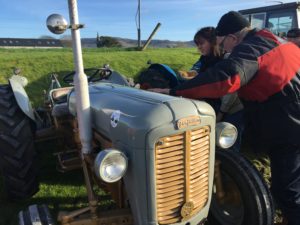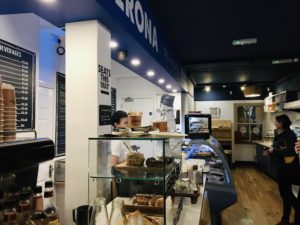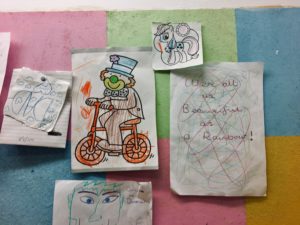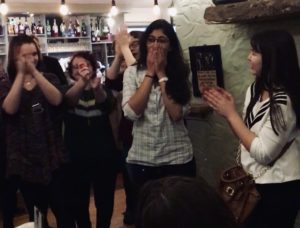Letting in Kindness Abroad
I arrived in Ireland two days before I could move into my accommodations at the Burren College of Art. I booked a room at a cheap inn I found online with a sparse website and no numbers in its address. I was staying in Ennis, a market town in the west of Ireland. It was a wet, grey afternoon, and I was tired, dirty, hungry and uninspired. But, I was determined to stay up to get used to the new time zone. I walked all through the strange, colorful town, meandering through shops and bakeries and cobblestone laneways (alleyways), watching, listening, silently taking it all in.

I love the feeling of traveling alone, of being a ghost in a new city, but I also know that there is no solid relationship with a place without a relationship to the people who inhabit it. I got over my initial shyness about my American accent and began making conversation with people in the shops. A woman who owned a lovely old book store told me about her daughter’s poetry and taught me the word for poetry in Gaelic. People in the supermarket line helped me with my euros, and a baby being walked by her father came up to my table, waving as she gave me a big, toothless grin. That night, I was invited to join a table of older gentleman in a pub. I’m always wary of men, but I figured there was no harm in talking, so I sat down and had a pint with them. An hour turned into two as they laughed and joked and slagged (made fun of) each other, and eventually the wife of one of the men invited me back to their house for dinner. I was brought into a carefully maintained family home, fed steak and sausages and spuds, given wine and a spontaneous live performance of Irish ballads. When I left, the husband and wife invited me back, told me to consider them my parents while I was abroad, and gave me advice on how to navigate the countryside.
EXPERIENCING INTERNATIONAL KINDNESS IN A TROUBLED WORLD

The first and most important lesson I learned in Western Ireland is that given the chance, many people will astound you with their kindness and generosity and increase your faith in humankind. In an era of seemingly endless headlines detailing the dangers of the modern world, it is easy to think that the only international currency of humanity is fear. Every hour brings more accounts of tragedies, genocide, nationalist politicians, hate-crimes, natural disasters, climate change, epidemics, accidents and famines. With horror, grief and injustice saturating our everyday experiences, it is natural to look at this world, our world, through eyes of distrust. We are taught this caution as children, constantly reminded to curtail natural curiosity and openness with warnings of terrible kidnappings and “stranger danger.”
I am not here to tell anyone that it is wrong to live with caution. Part of being an adult is understanding your own fallibility and mortality and protecting yourself and others from the hazards of life. Denying the presence of all that is hurtful and harmful is neither realistic nor safe, so I do not advocate for wearing rose colored glasses, at least not all the time.
RISKING CONNECTION IS UNCOMFORTABLE, BUT WORTH IT

Receiving these gifts requires trust and a certain level of vulnerability, and although many of us have had these qualities discouraged since childhood, rediscovering them in your study abroad experience will prove infinitely more valuable than any guidebook or tour. Taking the risk to listen, ask, smile, laugh and get a little less jaded about humanity allows for the incredible connections and shared moments that will form the backbone of an amazing experience abroad.
IRISH GENEROSITY: A CULTURAL NORM, AN INCREDIBLE GIFT

What I’ve found is that underneath the dry, biting humor, curse laden speech and direct questions about American political figures, openness and generosity are somewhat of a norm in Ireland. Despite (or perhaps because of) the recent recession, the centuries of civil unrest, and economic crises, I’ve had bartenders looking out for me, been asked to join first a traditional music session and then a ukulele band, given many lifts (NOT RIDES) and always pointed in the right direction for the bus. An innkeeper spent forty-five minutes showing me pictures of the Irish countryside and a group of young men enlightened me on the difference between Irish hurling and football.
The other students I am with, who encompass a variety of different cultures, races and world views, have reported similar interactions. A girl who recently celebrated her birthday was being sent a small amount of money and a card from her parents in India through our town’s only market. The small grocery gave my friend a basket full of cupcakes and food items along with her parents’ gift. When the woman processing my friend’s visa found out she had relatives who owned restaurants in the American city where my friend lived, she urged her to look them up and get discounts when she returned home. Ireland is not rich in land or resources, but its people are wealthy with connections. If they can’t find them, they make them, no matter how many differences exist. The only requirement is to be open.
Laura Kennedy is an Art Therapy major at Avila University and studied abroad with IFSA-Butler at the Burren College of Art in Ireland in Spring 2019. She is an International Correspondent for IFSA-Butler through the Work-To-Study Program.
